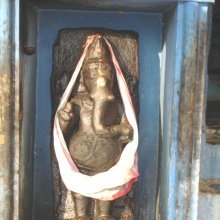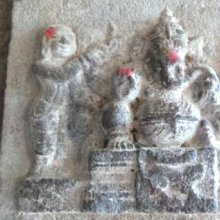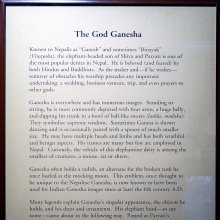Modaka, Modāka, Modakā: 28 definitions
Introduction:
Modaka means something in Hinduism, Sanskrit, Jainism, Prakrit, Buddhism, Pali, Marathi, Hindi. If you want to know the exact meaning, history, etymology or English translation of this term then check out the descriptions on this page. Add your comment or reference to a book if you want to contribute to this summary article.
Alternative spellings of this word include Modak.
Images (photo gallery)
In Hinduism
Shilpashastra (iconography)
Source: Red Zambala: Hindu Icons and Symbols | Inner Circle IVThe sweets (modaka) of Gaṇeśa — represents the basic needs for food, clothing and shelter. One should never neglect one’s physical well-being while one is practicing spiritual discipline. The spiritual life is to be followed in harmony with a material life — not in opposition to it.
Source: Shodhganga: The significance of the mūla-beras (śilpa)Modaka (“rice sweet”) refers to one of the several “attributes” (āyudha) or “accessories” of a detiy commonly seen depicted in Hindu iconography, defined according to texts dealing with śilpa (arts and crafs), known as śilpaśāstras.—The śilpa texts have classified the various accessories under the broad heading of āyudha or karuvi (implement), including even flowers, animals, and musical instruments. The other miscellaneous articles found as attributes in the hands of the deities are, for example, Modaka.

Shilpashastra (शिल्पशास्त्र, śilpaśāstra) represents the ancient Indian science (shastra) of creative arts (shilpa) such as sculpture, iconography and painting. Closely related to Vastushastra (architecture), they often share the same literature.
Ayurveda (science of life)
Dietetics and Culinary Art (such as household cooking)
Source: Shodhganga: Dietetics and culinary art in ancient and medieval IndiaModaka (मोदक) refers to a “sweet ball”, according to the Vālmīki-Rāmāyaṇa Yuddhakhaṇḍa 131.38, and is commonly found in literature dealing with the topics of dietetics and culinary art, also known as Pākaśāstra or Pākakalā.—The discussions on rice can be seen only in post-Ṛgvedic literature. [...] Vālmīki-Rāmāyaṇa describes modaka a typical sweet ball. [...] Svapnavāsavadatta (IV p.31) describes modaka as a sweet ball.
Kalpa (Formulas, Drug prescriptions and other Medicinal preparations)
Source: Ancient Science of Life: Yogaśataka of Pandita VararuciModaka (मोदक) or Guṭikā refers to “formulated pills”, as dealt with in the 10th century Yogaśataka written by Pandita Vararuci.—The Yogaśataka of Pandita Vararuci is an example of this category. This book attracts reader by its very easy language and formulations which can be easily prepared and have small number of herbs. It describes only those formulations (viz., modaka) which are the most common and can be used in majority conditions of diseases.
Source: Shodhganga: Edition translation and critical study of yogasarasamgrahaModaka (मोदक, “pill”) is another name for Gulikā, a Sanskrit technical term appearing in the 15th-century Yogasārasaṅgraha (Yogasara-saṅgraha) by Vāsudeva..—When the powdered drugs are mixed with the syrup of jaggary, sugar or guggulu or ground with water, milk or svarasa and made balls and dried it is known as Guḷikā [Gulikā]. Vaṭaka, vaṭi, modaka, vaṭikā, piṇḍī and varti are its synonyms.
Unclassified Ayurveda definitions
Source: Wisdom Library: Āyurveda and botanyModaka (मोदक) is a form of Rasakriyā where the decoction of drugs becomes completely solid after being boiled. The term is used throughout Ayurvedic literature such as the Caraka-saṃhitā and the Suśruta-saṃhitā.
Source: gurumukhi.ru: Ayurveda glossary of termsModaka (मोदक):—A synonym of vati with variation in the size a quantum of solid dose form – little bigger than the vati

Āyurveda (आयुर्वेद, ayurveda) is a branch of Indian science dealing with medicine, herbalism, taxology, anatomy, surgery, alchemy and related topics. Traditional practice of Āyurveda in ancient India dates back to at least the first millenium BC. Literature is commonly written in Sanskrit using various poetic metres.
Purana and Itihasa (epic history)
Source: Wisdom Library: Padma-puranaModaka (मोदक) refers to a type food-stuff used in the worship of Gaṇeśa, according to the Padmapurāṇa 1.65 (“The Slaying of Kālakeya”).—Accordingly, as Vyāsa said:—“[...] The king is not angry with him; plague does not occur in his house; he does not feel the dearth (of anything); he does not suffer from weakness after (i.e. due to his) having worshipped Gaṇeśa. ‘(My) salutation to the chief of the Gaṇas, who removes all difficulties, who was worshipped even by gods for accomplishing their desired objects’. The sacred formula is: ‘Om, salutation to Gaṇapati’. He, who would worship the protector of the Gaṇas, with flowers dear to Viṣṇu, and other fragrant flowers, with modakas, fruits, roots and other seasonal things, with curds and milk, pleasing musical instruments, and with incense and (other) fragrant (objects) obtains success in all undertakings. [...]”.
Source: archive.org: Nilamata Purana: a cultural and literary studyModaka (मोदक) refers to “sweetmeat”, forming part of a common diet in ancient Kashmir (Kaśmīra) as mentioned in the Nīlamatapurāṇa.—Modaka is recommended as an offering for Vināyaka (verse 698). Most of the references to the articles of diet occur in the Nīlamata in connection with the offerings made to the gods but it is not difficult to infer from them the food and drink of the common people because “what a man eats his gods eat”.
Source: archive.org: Shiva Purana - English TranslationModaka (मोदक) refers to “sweets”, which, when made of Śālik rice, forms a preferable constituent for a great offering, according to the Śivapurāṇa 1.16. Accordingly, “[...] the great offering of eatables shall be made to Śiva especially in the month of Dhanus. The constituent parts of the great offering are as follows:—[...] sweets (modaka) made of Śālika rice [...] This great offering of eatables made to the deities shall be distributed among devotees m the order of their castes”.
Source: Cologne Digital Sanskrit Dictionaries: The Purana Index1) Modaka (मोदक).—A Janapada of the Ketumālā continent.*
- * Vāyu-purāṇa 44. 15.
2a) Modāka (मोदाक).—A son of Havya after whom came Modākavarṣa.*
- * Brahmāṇḍa-purāṇa II. 14. 17. 20.
2b) A kingdom of Śākadvīpa adjoining the Āmbikeya hill named after Modāka.*
- * Brahmāṇḍa-purāṇa II. 14. 20; 19. 93; Vāyu-purāṇa 33. 19; 49. 87.

The Purana (पुराण, purāṇas) refers to Sanskrit literature preserving ancient India’s vast cultural history, including historical legends, religious ceremonies, various arts and sciences. The eighteen mahapuranas total over 400,000 shlokas (metrical couplets) and date to at least several centuries BCE.
Chandas (prosody, study of Sanskrit metres)
Source: Shodhganga: a concise history of Sanskrit Chanda literatureModakā (मोदका) refers to one of the 130 varṇavṛttas (syllabo-quantitative verse) dealt with in the second chapter of the Vṛttamuktāvalī, ascribed to Durgādatta (19th century), author of eight Sanskrit work and patronised by Hindupati: an ancient king of the Bundela tribe (presently Bundelkhand of Uttar Pradesh). A Varṇavṛtta (e.g., modakā) refers to a type of classical Sanskrit metre depending on syllable count where the light-heavy patterns are fixed.

Chandas (छन्दस्) refers to Sanskrit prosody and represents one of the six Vedangas (auxiliary disciplines belonging to the study of the Vedas). The science of prosody (chandas-shastra) focusses on the study of the poetic meters such as the commonly known twenty-six metres mentioned by Pingalas.
In Jainism
General definition (in Jainism)
Source: academia.edu: Tessitori Collection IModaka (मोदक) refers to “sweets” (suitable for offerings), according to the Ḍhaṃḍhaṇaṛṣisajjhāya by Jinaharṣa dealing with the lives of Jain teachers.—The Ḍhaṃḍhaṇaṛṣi-sajjhāya (in Gujarati) is included in the collection of manuscripts at the ‘Vincenzo Joppi’ library, collected by Luigi Pio Tessitori during his visit to Rajasthan between 1914 and 1919.—Accordingly, “[...] When Kṛṣṇa learnt that it was Ḍhaṃḍhaṇa because of his special resolution, he invited him to his house and offered sweets (modaka). The monk asked Nemi whether his previously hindering karma had ended and whether he could accept this food. As the answer was negative, the monk did not accept the food and later got omniscience. He is praised for steadiness in his resolution”.

Jainism is an Indian religion of Dharma whose doctrine revolves around harmlessness (ahimsa) towards every living being. The two major branches (Digambara and Svetambara) of Jainism stimulate self-control (or, shramana, ‘self-reliance’) and spiritual development through a path of peace for the soul to progess to the ultimate goal.
Languages of India and abroad
Pali-English dictionary
Source: BuddhaSasana: Concise Pali-English Dictionarymodaka : (m.) a globular sweet-meat.
Source: Sutta: The Pali Text Society's Pali-English DictionaryModaka, (cp. Epic. Sk. modaka in meaning 1) 1. a sort of sweetmeat S. I, 148; A. I, 130; III, 76; Pug. 32; PvA. 4. ‹-› 2. receptacle for a letter, an envelope, wrapper or such like J. VI, 385 (paṇṇaṃ °assa anto pakkhipitvā). May, however, be same ạs 1. (Page 542)

Pali is the language of the Tipiṭaka, which is the sacred canon of Theravāda Buddhism and contains much of the Buddha’s speech. Closeley related to Sanskrit, both languages are used interchangeably between religions.
Marathi-English dictionary
Source: DDSA: The Molesworth Marathi and English Dictionarymōḍaka (मोडक).—m A kind of ḍōṅgaḷā or large black ant.
--- OR ---
mōḍakā (मोडका).—a (mōḍaṇēṃ) Broken. (With implication of injury or damage.)
--- OR ---
mōdaka (मोदक).—m (S) A sort of sweetmeat.
--- OR ---
mōdaka (मोदक).—a S That delights, rejoices, gladdens.
Source: DDSA: The Aryabhusan school dictionary, Marathi-Englishmōḍakā (मोडका).—a Broken.
--- OR ---
mōdaka (मोदक).—m A sort of sweetmeat. a That delights.
Marathi is an Indo-European language having over 70 million native speakers people in (predominantly) Maharashtra India. Marathi, like many other Indo-Aryan languages, evolved from early forms of Prakrit, which itself is a subset of Sanskrit, one of the most ancient languages of the world.
Sanskrit dictionary
Source: DDSA: The practical Sanskrit-English dictionaryModaka (मोदक).—a. (-kā, -kī f.) [मोदयति-मुद् णिच् ण्वुल् (modayati-mud ṇic ṇvul)]
1) Pleasing, delighting, gladdening.
2) Glad, delighted.
-kaḥ, -kam 1 A sweetmeat in general; Y.1.289 (com. modakāḥ laḍḍukāḥ).
2) A kind of pill (in medicine).
-kaḥ Name of a mixed tribe (sprung from a Kṣatriya father and a Śūdra mother).
Source: Cologne Digital Sanskrit Dictionaries: Shabda-Sagara Sanskrit-English DictionaryModaka (मोदक).—mfn.
(-kaḥ-kī-kaṃ) Delighting, rejoicing, causing happiness or delight. mn.
(-kaḥ-kaṃ) A sort of sweetmeat. m.
(-kaḥ) A mixed caste. E. mud to be glad, in the causal form, to make glad, and ṇvul aff.
Source: Cologne Digital Sanskrit Dictionaries: Benfey Sanskrit-English DictionaryModaka (मोदक).—i. e. mud + aka, I. adj. Delighting. Ii. m. and n. A sort of sweetmeat, [Pañcatantra] i. [distich] 303; sweetmeats in general, [Vikramorvaśī, (ed. Bollensen.)] 45, 13.
Source: Cologne Digital Sanskrit Dictionaries: Cappeller Sanskrit-English DictionaryModaka (मोदक).—[adjective] delighting (—°); [masculine] [neuter] small round comfit, smeetmeat.
Source: Cologne Digital Sanskrit Dictionaries: Monier-Williams Sanskrit-English Dictionary1) Modaka (मोदक):—[from moda] mfn. (ifc.) gladdening, exhilarating, [Mahābhārata]
2) [v.s. ...] m. n. a small round sweetmeat, any sweetmeat, [Mahābhārata; Rāmāyaṇa] etc.
3) [v.s. ...] m. (in medicine) a kind of pill, [Suśruta; Bhāvaprakāśa]
4) [v.s. ...] a [particular] mixed caste (the sons of a Kṣatriya by a Śūdra mother), [cf. Lexicographers, esp. such as amarasiṃha, halāyudha, hemacandra, etc.]
5) [from moda] n. a kind of metre, [Colebrooke]
Source: Cologne Digital Sanskrit Dictionaries: Yates Sanskrit-English DictionaryModaka (मोदक):—[(kaḥ-kī-kaṃ) a.] Rejoicing. m. n. A sort of sweetmeat.
Source: DDSA: Paia-sadda-mahannavo; a comprehensive Prakrit Hindi dictionary (S)Modaka (मोदक) in the Sanskrit language is related to the Prakrit word: Moaga.
[Sanskrit to German]
Sanskrit, also spelled संस्कृतम् (saṃskṛtam), is an ancient language of India commonly seen as the grandmother of the Indo-European language family (even English!). Closely allied with Prakrit and Pali, Sanskrit is more exhaustive in both grammar and terms and has the most extensive collection of literature in the world, greatly surpassing its sister-languages Greek and Latin.
Hindi dictionary
Source: DDSA: A practical Hindi-English dictionaryModaka (मोदक) [Also spelled modak]:—(nm) a typical indigenous sweetmeat;-see [laḍḍū].
...
Kannada-English dictionary
Source: Alar: Kannada-English corpusMōḍakā (ಮೋಡಕಾ):—
1) [noun] old and used goods.
2) [noun] ಮೋಡಕಾ ಅಂಗಡಿ [modaka amgadi] mōḍakāaṃgaḍi a shop where old and used goods are sold.
--- OR ---
Mōdaka (ಮೋದಕ):—[adjective] making glad; gladdening; delighting.
--- OR ---
Mōdaka (ಮೋದಕ):—[noun] a kind of sweet pudding.
--- OR ---
Mōdaka (ಮೋದಕ):—[noun] = ಮೋದ [moda]2.
Kannada is a Dravidian language (as opposed to the Indo-European language family) mainly spoken in the southwestern region of India.
See also (Relevant definitions)
Starts with: Modaka Vani, Modakadi, Modakakara, Modakakaraka, Modakala, Modakalanem, Modakam, Modakama, Modakamaya, Modakapriya, Modakapriyaganesha, Modakapriyavighnesha, Modakapriyavinayaka, Modakara, Modakavallabha, Modakavida.
Ends with (+22): Amodaka, Anumodaka, Asyamodaka, Balamodaka, Bhasmodaka, Brihajjirakadimodaka, Candranathamodaka, Dalamodaka, Dharmodaka, Dhatrimodaka, Dindiramodaka, Gharmmodaka, Gharmodaka, Himodaka, Kaddamamodaka, Kaddamodaka, Kameshvaramodaka, Kamodaka, Kanthamodaka, Kardamodaka.
Full-text (+76): Khandamodaka, Dindiramodaka, Mudgamodaka, Modakakara, Modakamaya, Modakavallabha, Kumodaka, Kaumodaki, Siddhamodaka, Sudhamodaka, Vataka, Maudaka, Shitibhu, Ukata, Rak, Ukada, Motaka, Modaka Vani, Motakappiriyan, Modage.
Relevant text
Search found 30 books and stories containing Modaka, Modāka, Mōḍaka, Moḍaka, Mōḍakā, Moḍakā, Mōdaka, Modakā; (plurals include: Modakas, Modākas, Mōḍakas, Moḍakas, Mōḍakās, Moḍakās, Mōdakas, Modakās). You can also click to the full overview containing English textual excerpts. Below are direct links for the most relevant articles:
Sahitya-kaumudi by Baladeva Vidyabhushana (by Gaurapada Dāsa)
Text 5.12 < [Chapter 5 - Second-rate Poetry]
The Skanda Purana (by G. V. Tagare)
Chapter 214 - Procedure of Gaṇapati Worship < [Section 1 - Tīrtha-māhātmya]
Chapter 11 - Procedure of Gaṇeśa Worship: Manifestation of Lakṣmī < [Section 1 - Kedāra-khaṇḍa]
Chapter 341 - Greatness of God Vighnarāja of Āśāpūra < [Section 1 - Prabhāsa-kṣetra-māhātmya]
Vakyapadiya of Bhartrihari (by K. A. Subramania Iyer)
Verse 3.7.130 < [Book 3 - Pada-kāṇḍa (7): Sādhana-samuddeśa (On the Means)]
The Brahmanda Purana (by G.V. Tagare)
Chapter 14 - The race of Priyavrata < [Section 2 - Anuṣaṅga-pāda]
Chapter 19 - Description of Plakṣa and other continents (dvīpa) < [Section 2 - Anuṣaṅga-pāda]
The Garuda Purana (by Manmatha Nath Dutt)
Chapter CXVII - The Ananga trayodasi Vratam < [Brihaspati (Nitisara) Samhita]
Chapter CXXXVI - The Sravana Dvadasi Vratas etc < [Brihaspati (Nitisara) Samhita]
Chapter CCXVII - Various Recipes for the cure of sterility, virile impotency, etc. < [Dhanvantari Samhita]
The Markandeya Purana (Study) (by Chandamita Bhattacharya)
Food that are not to be Stolen < [Chapter 2]
Related products



